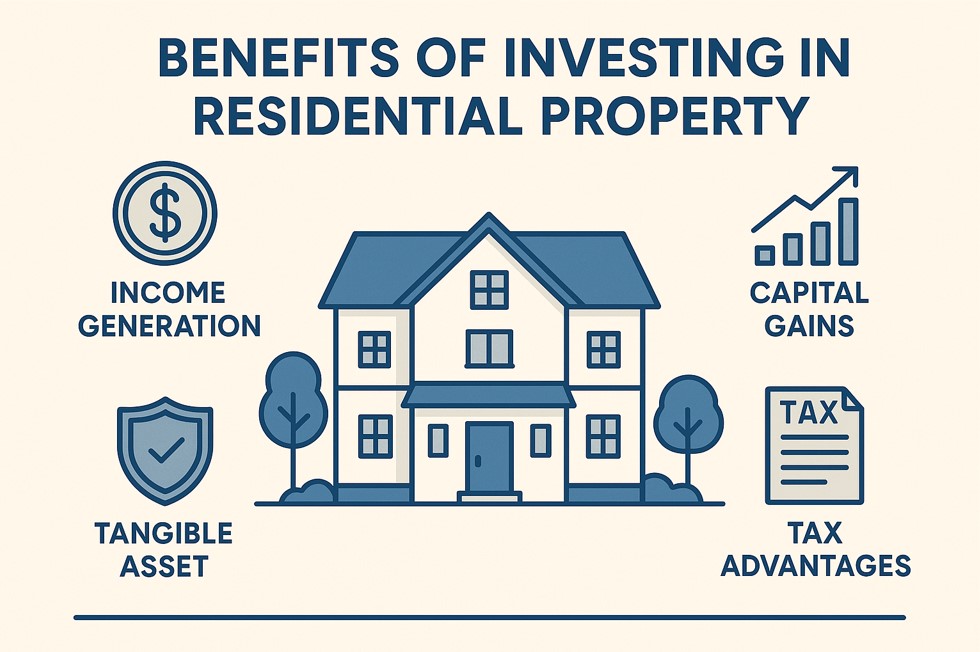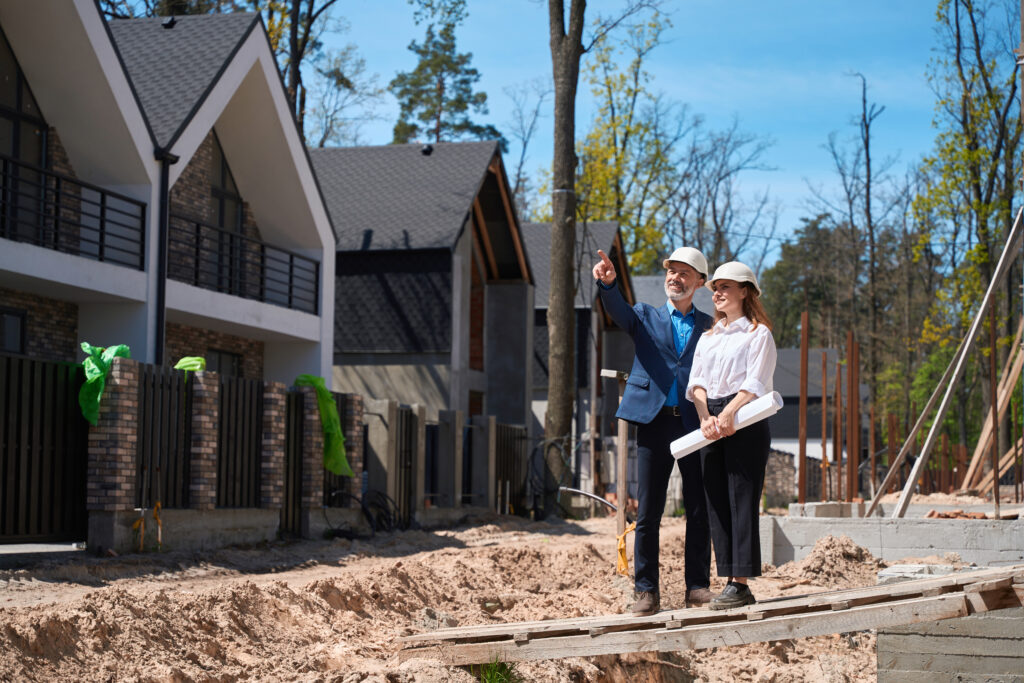Alright, let’s keep it simple. Residential property investment is when you buy a house or an apartment not to live in—but to rent out and (hopefully) grow your wealth over time.
It could be:
- A standalone house in the suburbs.
- A city apartment close to uni or offices.
- Even a small unit you picked up at a bargain in a rising area.
And why does it matter?
Because in a world full of volatile stocks, low interest savings accounts, and crypto chaos… property is that old-school, bricks-and-mortar type of investment that people still trust. You can actually drive past it. You can fix it up. You can rent it out. It’s real, and that’s reassuring—especially when you’re thinking long-term.
In New Zealand, property’s been a favourite go-to for years. Whether it’s a family trying to secure their future, a retiree looking for income, or someone like you and me wanting a bit of freedom—residential property can be a solid piece of the puzzle.
But hey, it’s not just about dreams and fresh paint. There are real benefits (and a few risks) that come with the territory.
The financial upside of residential property investment
Let’s be honest—most of us don’t invest in property just for fun. We do it because we want to build wealth, create extra income, and maybe (just maybe) buy back a bit of our time and freedom down the line. So what’s in it for you, financially?

Rental Income: The power of a steady cash flow
One of the biggest perks? Regular money landing in your bank account.
When you rent out a property, you’re basically setting up a mini business. Your tenants pay rent, and after covering your mortgage and a few costs, what’s left is your income.
Let’s say:
- You buy a $600,000 property.
- You rent it out for $600 per week.
- Your mortgage and expenses sit around $500 per week.
That’s a $100/week buffer—$5,200 a year. Not bad, right? And if the rent goes up over time while your mortgage stays stable, your cash flow improves. That’s the magic of holding for the long term.
Capital Gains: Building wealth while you sleep
‘’If you don’t find a way to make money while you sleep, you will work until you die.” Warren E. Buffet
If you’d bought an average Auckland property 10 years ago… well, you’d probably be smiling right now. Property values in New Zealand have historically gone up over time (with a few bumps along the way, of course).
Here’s a real-world example:
In 2013, the median house price in NZ was around $400,000. By 2023? Close to $780,000. That’s almost double in a decade.
Now, it’s not guaranteed. But over the long haul, residential property tends to grow in value—especially if you’ve bought in the right area, done your research, and held on during the tough years.
Tax Benefits: Yes, you can legally pay less
Yep—property investors can claim a bunch of expenses to reduce their taxable income. Here’s what you might be able to claim:
- Mortgage interest (now partially phased back in after tax law changes)
- Rates and insurance
- Property management fees
- Repairs and maintenance
- Accounting costs (👋 BH Accounting can help here!)
- Depreciations
Let’s say your rental property earns $30,000 in a year, and your deductible expenses add up to $10,000—you’re only taxed on the $20,000.
Always check the latest IRD updates or talk to a property accountant to make sure you’re claiming the right stuff. But just know—there are legit ways to keep more of your rental income in your pocket.
Leverage: Growing your portfolio without starting from scratch
Here’s the fun part—once your first property goes up in value, you might be able to use that equity to buy your second.
For example:
- Property bought for $500K
- Now worth $650K
- Mortgage is down to $400K
You’ve got $250K in equity, and some of that could help you secure your next deal. It’s how a lot of investors go from one rental to a small portfolio without needing to save a brand-new deposit each time.
Inflation Hedge: Property moves with the times
When inflation hits, the cost of everything goes up. Luckily, property values—and rents—tend to follow. So while your money in the bank loses purchasing power, your property is more likely to keep up with inflation.
Plus, if you’ve got a fixed mortgage, your repayments stay the same while rents go up. That’s another win.
Proven investment strategies to grow your property portfolio
Alright—so you’re keen on investing in residential property. Great start. But the next big question is: how do you want to play the game?
Approximately 78% of property investors in New Zealand own a single rental property, about 16% own between two and three rentals, and landlords with four or more rentals comprise less than 6% of the investor population.
There’s no one-size-fits-all strategy. It depends on your goals, your risk tolerance, and how hands-on you want to be. Below are a few of the most popular strategies Kiwis (and savvy investors around the world) use to build wealth through property.
Let’s break them down.
Buy and Hold: The slow and steady classic
This is the go-to strategy for most long-term investors.
You buy a property, rent it out, and hold onto it for 10, 15, even 30 years. Meanwhile, your tenants help pay down the mortgage, the value of the property (hopefully) increases, and one day you’ve got a debt-free home that’s grown massively in value.
💡 Tip: Look for suburbs with low vacancy rates, good schools, and planned infrastructure upgrades. That’s where long-term growth often happens.
Buy and Flip: Sweat Equity and quick wins
Got an eye for design or a background in renos? Flipping might be your thing.
You buy an underpriced or run-down property, do it up, and sell it for a profit. The upside? Quick returns if the market’s right. The downside? It’s work, and your profit depends on renovation costs, timing, and market conditions.
💡 Pro tip: Don’t overcapitalise. Focus on high-impact, low-cost renos like paint, flooring, and kitchens.
Leverage your Equity: Grow without saving a new deposit
This is how many investors scale up.
Let’s say your home or first investment has gone up in value. Instead of waiting years to save a 20% deposit for another property, you use the built-up equity as security for the next one.
It’s like recycling your success.
In October 2024, mortgage lending to investors for residential properties in New Zealand totaled around NZ$1.71 billion!
💡 Chat with a mortgage broker before making moves—they’ll help you figure out how much equity you can tap into safely.
Rent by Room or Airbnb: Boost your yield
Want to squeeze more income out of a single property?
Renting by the room (think student housing or flatshares) or running short-term Airbnb stays can significantly increase your rental income—especially in high-demand areas.
But heads up—it comes with more management, higher wear and tear, and sometimes stricter council rules.
💡 Check local bylaws and do the maths before going all in.
Strategy Comparison Table
| Strategy | Goal | Effort Level | Typical Timeframe | Pros | Cons |
|---|---|---|---|---|---|
| Buy and Hold | Long-term wealth | Low-Medium | 10+ years | Passive income, capital growth | Slower results, tied-up capital |
| Buy and Flip | Quick profits | High | 3–12 months | Fast equity gains, hands-on control | Time-consuming, market risk |
| Use Equity | Scale up fast | Medium | Variable | No new deposit needed, accelerates growth | Risk of overleveraging |
| Rent by Room/Airbnb | Maximise rental income | High | Ongoing | Higher yield, flexible pricing | More admin, guest turnover, council regs |
Which one’s for you?
Honestly, it might be a mix. A lot of investors start with buy-and-hold, then add flips or short-term rentals once they’ve got experience (and a bit of cash to play with).
The key is knowing your strengths—and your stress limits.

The risks of residential property investment (and how to mitigate them)
Look, property investment is awesome—but it’s not a magic money machine. There are risks, and pretending otherwise would be dishonest.
But here’s the good news: most of those risks can be managed. Sometimes even avoided. Let’s run through the big ones—and how you can stay out of trouble.
Property Vacancies and Bad Tenants
Your property is only making money when it’s rented. Obvious, right?
But if it sits empty for weeks (or months), or you get stuck with a tenant who doesn’t pay rent and trashes the place… it can turn into a serious cash drain.
How to fix it:
- Screen your tenants properly (references, credit checks, etc.)
- Use a reputable property manager—worth every dollar
- Invest in areas with hig demand and low vacancy rates
- Take out landlord insurance (seriously, do it)
Market fluctuations and interest rate surprises
House prices go up… and sometimes they go down. Same for interest rates. If you bought at the peak and rates shoot up, your cash flow can get squeezed.
How to fix it:
- Stress-test your numbers with higher interest rates
- Don’t rely on capital gains to “rescue” a poor deal
- Fix your mortgage rate for peace of mind if needed
- Invest for the long term—it smooths out short-term bumps
Ongoing costs and unexpected repairs
Hot water cylinder dies? Roof leak? Council rates just doubled?
Yeah, it happens.
How to fix it:
- Budget 5–10% of rental income for maintenance
- Build an emergency buffer fund (even just $2–5k helps)
- Stay on top of routine upkeep so small problems don’t grow
- Claim eligible maintenance costs at tax time
Legal and Compliance headaches
In New Zealand, tenancy laws change fairly regularly. You’ve got Healthy Homes standards, bright-line rules, and new tax rules to keep up with.
How to fix it:
- Keep up with IRD and Tenancy Services updates
- Use a property accountant (like BH Accounting 😉)
- Work with a property manager who knows the law
- Join landlord forums or property investor associations for updates
Emotional investing: Acting on fear or FOMO
It’s easy to panic when the media says “property is crashing” or jump in too fast because “everyone’s buying in that suburb.”
How to fix it:
- Know your numbers before emotion takes over
- Stick to your investment criteria
- Take your time—there’s always another deal
- Think long term, not “next month”
Residential vs. Commercial vs. REITs – What’s the best fit for you?
When people think about investing in property, they often picture buying a house and renting it out. But that’s just one option. You can also invest in commercial property—like office spaces or shops—or even go completely hands-off with something called a REIT, short for Real Estate Investment Trust.
Let’s unpack the three and figure out which one might suit your goals and lifestyle.
Residential Property: A simple, solid starting point
Residential property is the most common investment type, and it’s often the easiest to understand. Most of us have lived in a house or flat, so wrapping your head around how a rental works feels pretty natural. The entry cost is usually lower than commercial property, and there’s consistent demand for housing across most regions. What makes it appealing is the level of control—you choose the property, the tenants, and whether you manage it yourself or bring in a property manager.
Of course, there are challenges too. Vacancies, bad tenants, or slow market growth can impact your returns. But with good research and a long-term mindset, it’s a steady way to build wealth. For many first-time investors, this strategy offers a balance of accessibility, risk, and return.
Commercial Property: Higher stakes, bigger rewards
Commercial property—think warehouses, offices, and retail spaces—tends to offer higher rental yields and longer leases. This means more income and fewer tenant turnovers, which can be attractive if you’re focused on cash flow. In many commercial leases, tenants even cover some of the running costs, like insurance and maintenance, which lightens the load for the owner.
That said, commercial property comes with a higher price tag and more complexity. Lenders usually want a larger deposit, and if your tenant leaves, it can take much longer to find a new one. There’s more risk here, so commercial investing is often better suited to those who are more experienced or have deeper financial reserves.
REITs: Hands-Off Investing with property exposure
REITs, or Real Estate Investment Trusts, allow you to invest in property without actually owning a house or building. You buy shares in a fund that holds a bunch of income-producing properties—residential, commercial, or even industrial. The benefit is clear: it’s accessible, low-maintenance, and liquid. You can invest with just a few hundred dollars and sell your shares easily, just like stocks.
The downside? You’re not in control. You don’t choose what properties the fund invests in, and you can’t add value through renovations or refinancing. Returns can also swing with the broader stock market, which adds a layer of volatility. But for people who want to diversify without being a landlord, REITs can be a smart addition to an investment portfolio.

So… Which one’s right for you?
It all comes down to your goals, budget, and appetite for involvement. If you like having control and are willing to learn as you go, residential property is a great way to get started. If you’ve got more capital and want stronger cash flow, commercial might be a good fit—but be ready for higher risk and longer vacancies. And if you want a truly passive experience with property exposure, REITs offer that flexibility.
I started with residential property because it felt manageable and gave me room to grow. No regrets. It taught me a lot, helped me build equity, and gave me the confidence to take on more later. Sometimes slow and steady really does win the race.
Final Word
You don’t need to be rich, lucky, or a real estate genius to invest in residential property. You just need to be informed, patient, and willing to take the first step.
No hype. No shortcuts. Just consistent action and smart decisions.
Start where you are. Use what you have. And don’t be afraid to ask for help—we’ve all been there.
